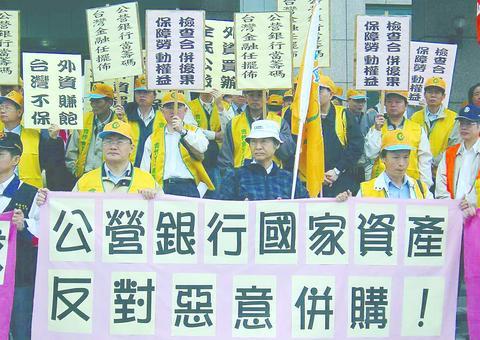Violence was narrowly averted yesterday at a meeting between union representatives of local banks and the Financial Super-visory Commission (FSC) as union members petitioned the commission to facilitate the merger of four state-run financial institutions.
The National Federation of Bank Employees' Unions (銀行員工會) told the commission that the government's goal to consolidate the domestic financial sector was not in the best interests of bank employees.

PHOTO: THE NATIONAL FEDERATION OF BANK EMPLOYEES' UNIONS
Surrounded by over 50 protesting members, the federation's secretary-general Han Shih-hsien (韓仕賢) said they are strongly opposed to the FSC's delegation of the task to a proposed mergers and acquisitions task force.
The task force will compile criteria that would only benefit foreign banks or big banking conglomerates, while failing to respect local market forces, he said.
The protest nearly turned into a fist fight after FSC Vice Chairman Lu Daung-yen (
The union members suggested that the FSC itself should facilitate the establishment of the Taiwan Financial Holding Co (台灣金控), following the proposed merger of the Bank of Taiwan (台灣銀行), Land Bank of Taiwan (土地銀行), Taiwan Cooperative Bank (合作金庫) and Central Trust of China (中信局).
The federation urged financial authorities to play an active role in safeguarding rights of bank employees by looking into their treatment after the mergers.
Lu told union representatives that the government will respect market forces while hammering out feasible strategies to elevate the level of consolidation among local banks, which are suffering from the nation's over-banking plight.
He said that bank employees' rights are protected by labor laws, and the FSC will demand that merged banks obey and enforce these laws.
As for the proposed merger, Lu said that the FSC will have to respect the decisions of the Ministry of Finance, which is the biggest shareholder of the four state-owned banks.

STEEP DECLINE: Yesterday’s drop was the third-steepest in its history, the steepest being Monday’s drop in the wake of the tariff announcement on Wednesday last week Taiwanese stocks continued their heavy sell-off yesterday, as concerns over US tariffs and unwinding of leveraged bets weighed on the market. The benchmark TAIEX plunged 1,068.19 points, or 5.79 percent, to 17,391.76, notching the biggest drop among Asian peers as it hit a 15-month low. The decline came even after the government on late Tuesday authorized the NT$500 billion (US$15.2 billion) National Stabilization Fund (國安基金) to step in to buoy the market amid investors’ worries over tariffs imposed by US President Donald Trump. Yesterday’s decline was the third-steepest in its history, trailing only the declines of 2,065.87 points on Monday and

TAKING STOCK: A Taiwanese cookware firm in Vietnam urged customers to assess inventory or place orders early so shipments can reach the US while tariffs are paused Taiwanese businesses in Vietnam are exploring alternatives after the White House imposed a 46 percent import duty on Vietnamese goods, following US President Donald Trump’s announcement of “reciprocal” tariffs on the US’ trading partners. Lo Shih-liang (羅世良), chairman of Brico Industry Co (裕茂工業), a Taiwanese company that manufactures cast iron cookware and stove components in Vietnam, said that more than 40 percent of his business was tied to the US market, describing the constant US policy shifts as an emotional roller coaster. “I work during the day and stay up all night watching the news. I’ve been following US news until 3am

Six years ago, LVMH’s billionaire CEO Bernard Arnault and US President Donald Trump cut the blue ribbon on a factory in rural Texas that would make designer handbags for Louis Vuitton, one of the world’s best-known luxury brands. However, since the high-profile opening, the factory has faced a host of problems limiting production, 11 former Louis Vuitton employees said. The site has consistently ranked among the worst-performing for Louis Vuitton globally, “significantly” underperforming other facilities, said three former Louis Vuitton workers and a senior industry source, who cited internal rankings shared with staff. The plant’s problems — which have not

TARIFF CONCERNS: The chipmaker cited global uncertainty from US tariffs and a weakening economic outlook, but said its Singapore expansion remains on track Vanguard International Semiconductor Corp (世界先進), a foundry service provider specializing in producing power management and display driver chips, yesterday withdrew its full-year revenue projection of moderate growth for this year, as escalating US tariff tensions raised uncertainty and concern about a potential economic recession. The Hsinchu-based chipmaker in February said revenues this year would grow mildly from last year based on improving supply chain inventory levels and market demand. At the time, it also anticipated gradual quarter revenue growth. However, the US’ sweeping tariff policy has upended the industry’s supply chains and weakened economic prospects for the world economy, it said. “Now